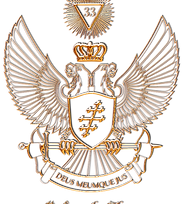Wall Street and Freemasonry
- Sep 27, 2023
- 3 min read
Written by SGC, Prof.Dr. Emmanuel Gerakios 33º
I invite you to examine together the parallel between Freemasonic reality and stock market movements.

A parallel with Freemasonry reality is easily presented.
A stock market bubble is a significant increase in stock prices without a corresponding increase in the value of the businesses they represent.
A company's valuation should be determined by its business fundamentals. Mainly incorporation legality and trading legality, earnings, growth rate and similar factors. A bubble is dominated by speculation and euphoria.

The stock market and Freemasonic structures, although they seem like different worlds, have many interesting similarities. Both systems are based on a form of "value" that can be both material and spiritual.
The "value" in a Freemasonic organization is determined by several factors: the historicity, the wisdom and tradition it conveys, the quality of the education and social structure it offers.
However, as in the stock market, there can be a tendency to "overestimate" the value of a particular organization or system within Freemasonry.
In the case of Freemasonry, the "bubble" may be the overestimation of the importance or influence of a particular Organization without a corresponding "real" value in legitimacy, morals, knowledge or practical skills.
In Freemasonry, "legitimacy" can refer to the authenticity of an organization, adherence to laws, rules, and traditions, as well as the ethical behavior of its members.
It is interesting to note that even in Freemasonry there is the possibility of "bubbles". There can sometimes be too much attention paid to external symbols, titles or hierarchies, and less to the essential "value" that a Masonic organization offers.

What is critical here is the "valuation" of Freemasonic organizations and practices based on "fundamentals" such as the regularity of its creation, the quality of education, the sincerity of the members and the substance of the teachings, rather than external symbols and surface impressions. Otherwise, we risk sinking into a "tectonic bubble", where real value and substance are lost in the noise of speculation and euphoria.
Legitimacy and transparency are fundamental to the valuation of a company on the stock market.

The key, in both the stock market and Freemasonry, is managing expectations and being transparent. The "growth" of a Masonic organization must be based on real achievements and the value it brings to its members and society, not on enthusiastic, but unfounded, promises or expectations. Otherwise, the risk of a "bubble" increases, with negative consequences for all involved.
Ultimately, in both the stock market and Freemasonry, "value" must be determined with care, realism, and respect for the institutions and traditions that govern it. Avoiding "bubbles" is critical to maintaining reliability and stability.
Stock Market Manipulation and Bubbles

As we know, stock markets are sensitive to information and speculation. A similar "manipulation" can also take place in Freemasonic organizations, when illegal or fraudulent organizations try to incorporate or obtain some kind of endorsement. In these cases, the onus is on the members and leadership of regular Masonic organizations to ensure that the "masonic stock market" remains healthy and trustworthy.
Promoting or promoting bubble stocks in the stock market is an act that is a violation of laws and goes against the broader principle of transparency and trust. Likewise, the Mason who promotes or suggests membership in an illegitimate or slanders and discredits a regular Freemasonic organization is behaving irresponsibly and unlawfully, opening the way for questioning and mistrust in the FM community.
Ultimately, managing the "stock market of Freemasonry" is an ongoing process that requires vigilance, transparency, and accountability from all members of the Masonic community. The existence of a healthy and reliable "stock exchange" ensures the stability and development of the Masonic tradition, protecting it from external threats and internal weaknesses.



Comments